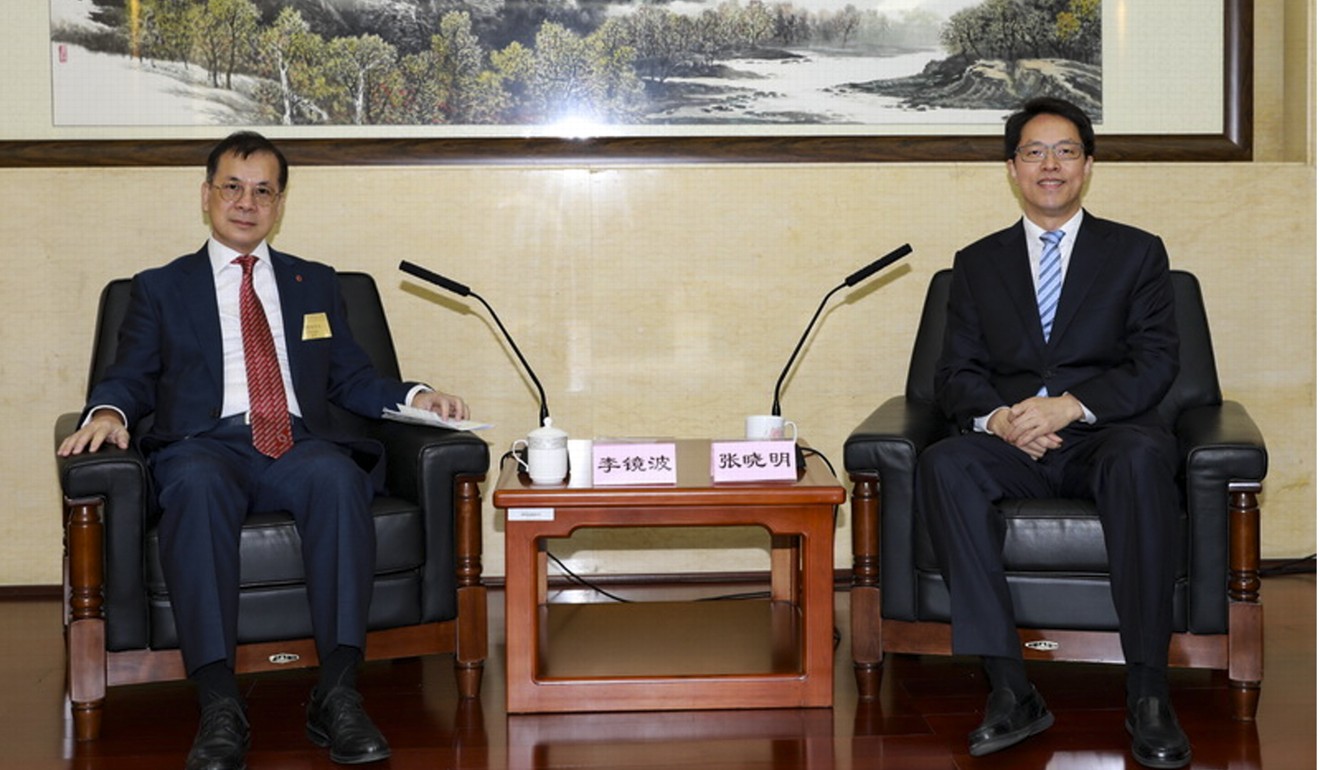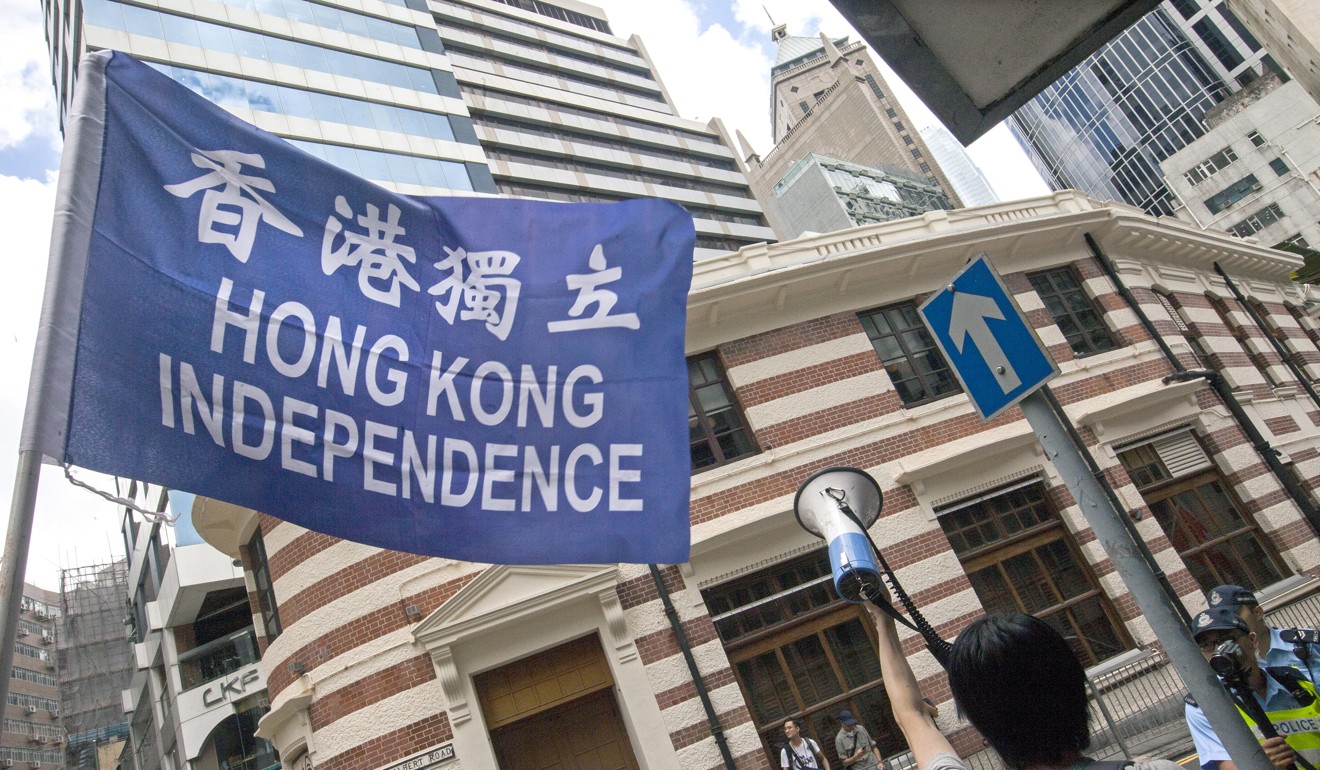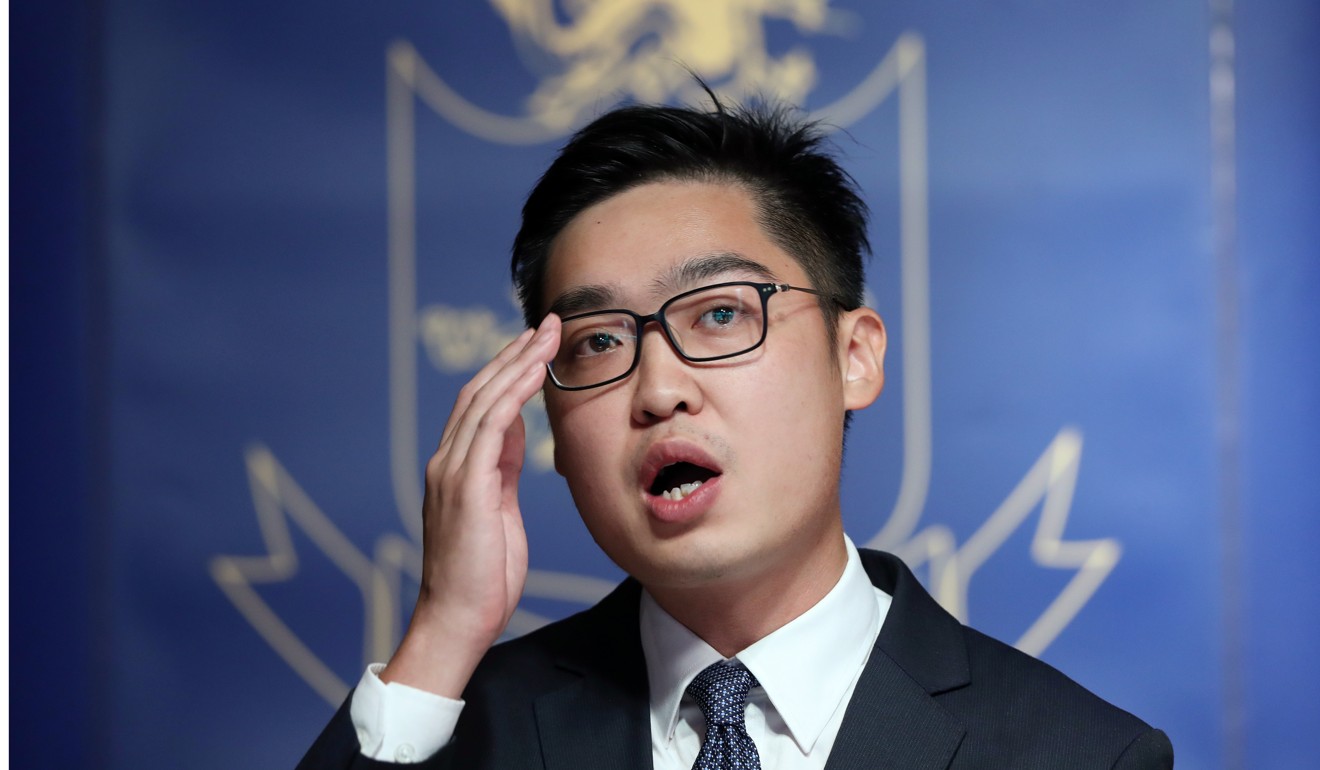
Students who associate with outlawed Hong Kong National Party can face criminal sanctions, government tells schools as top Beijing official welcomes ban
Education Bureau sends notices to all secondary schools and tertiary institutions as Beijing’s No 1 official for Hong Kong affairs commends decision to outlaw party, saying it posed risk to ‘national security and public order’
Hong Kong’s Education Bureau has warned secondary schools and universities to make sure their students do not associate with a recently banned pro-independence party, as it could constitute a criminal offence.
A two-page letter issued this week to all supervisors at more than 500 secondary schools said staff should advise students not to promote Hong Kong independence, join illegal societies, take part in their activities or offer them assistance, to avoid criminal liability.
Hong Kong students cautioned about independence debate as academic year begins
Tertiary institutions, including the eight publicly funded universities, received copies of the government notice gazetting the ban against the Hong Kong National Party and the full transcript of Secretary for Security John Lee Ka-chiu’s explanation of why he outlawed the party on national security grounds. There were no accompanying instructions.
The ban means anyone who associates with the party by serving it, participating in gatherings or providing financial assistance could be liable on conviction to a fine and a jail sentence of two to three years.
The bureau’s warning reinforced a concerted effort by officials to combat independence advocacy on school premises in recent years.
Students have issued fliers and stickers on or around campuses proposing that Hong Kong should split from China, while independence-themed posters and banners have surfaced on bulletin boards, leading to rows between administrators and students over freedom of speech.
Banners in support of the party and of Hong Kong independence appeared on the University of Hong Kong’s notice board on Wednesday, but were later removed.
The university’s student union, which manages the board, said it did not know who removed the banners.

News of the notices to schools emerged as a senior Beijing official in charge of Hong Kong affairs strongly backed Lee’s decision to ban the party.
Zhang Xiaoming, director of Beijing’s Hong Kong and Macau Affairs Office, told a visiting delegation from Hong Kong on Wednesday that the move was legally sound, as advocacy of separatism would “jeopardise national security and public order”.
China hits out at foreign attacks on Hong Kong National Party ban, but spokeswoman for US Secretary of State Mike Pompeo renews criticism just hours later
In the letter to schools dated Monday, Secretary for Education Kevin Yeung Yun-hung appealed to them to protect students from “being misled into taking part in any activity that [could be] lawbreaking or contravening the Basic Law”, referring to the city’s mini-constitution.
“If students [are found] to have any wrong or radical concepts, principals and teachers should provide guidance, clearly point out the facts, and inform their parents,” he wrote.
He also reminded them not to allow illegal societies to organise activities on their premises “in order to stop people abusing the school’s ... resources in promoting Hong Kong independence”.
Yeung said he hoped to continue to work with schools “to increase students’ understanding of the Basic Law ... so as to nurture the next generation to become citizens with a sense of national identity”.
Wu Siu-wai, vice-president of the pro-government Federation of Education Workers, and education lawmaker Ip Kin-yuen agreed it was rare for education authorities to issue such notices to schools.
Will Facebook agree to Hong Kong police’s request to take down page of banned Hong Kong National Party?
“Maybe the Education Bureau found it necessary to issue a reminder, considering that some pro-independence groups claim to have student members,” Wu said.
But he found the government’s use of the phrase “wrong and radical concepts” lacked clarity.
“Different schools and teachers may have different judgments on what ideas should be considered wrong and radical,” Wu said. “Opinions among parents and students are also very divided.”
If a pupil in his school shared a post from the National Party’s Facebook page, he would talk to the individual because sharing was akin to promoting the party’s cause, Wu said.
Ip, the vice-president of the Hong Kong Professional Teachers’ Union, said he in no way supported independence advocacy, and “external bodies should not use school campuses for political incitement or to meddle with schools’ normal operations”.
A threat to city’s freedom or a necessary step for security? Hong Kong National Party ban divides opinion
The Education Bureau said the National Party ban “might be related to schools’ daily management” so it had sent the letter as a reminder.
“The Education Bureau will continue to teach students and young people correct knowledge of the Basic Law, our country and history, as well as what actions are wrong, illegal or harmful to Hong Kong,” a spokeswoman said.

Since Monday, student groups from three universities – HKU, Chinese University and Polytechnic University – have issued statements condemning the ban.
The law association of HKU’s student union said: “The association is gravely concerned that the government may employ the same measure to suppress other political parties ... and draw arbitrary borders for freedom of speech.”
Explaining why he banned the party under the city’s Societies Ordinance, Lee said it was a necessary preventive action as the party had, among other things, expressed willingness to use force to achieve its independence goal.
Ban on Hong Kong National Party over ‘armed revolution’ call met with both cheers and fear
The ordinance and other Hong Kong laws were cited by Zhang in “analysing why the party should be banned” during his meeting with the Hong Kong Professional and Senior Executives Association, said its president Thomas Lee Kang-bor.
Several members of the delegation declared during the meeting that they “absolutely and firmly oppose Hong Kong independence and support the government’s ban”, he added.
“We also said illegal acts should not be tolerated in Hong Kong, and that freedom of speech has its boundaries. Public order and national security need to be taken into account. Zhang agreed with us and praised us for our clear stance,” Thomas Lee said.

Zhang did not bring up the topic of Hong Kong enacting a national security law but when the delegation on Tuesday met Shen Chunyao, chairman of the Basic Law Committee – a body that advises the central government on Hong Kong’s mini-constitution – Shen said rising pro-independence advocacy underscored the necessity for the city to do so.
Under Article 23 of the Basic Law, Hong Kong must pass legislation to prohibit “treason, secession, sedition and subversion” against the central government, but a bill to that effect was shelved in 2003 after half a million people took to the streets in opposition.
The ban has sparked fears that other political groups might be targeted and free speech curtailed.
On Tuesday night, US Secretary of State Mike Pompeo issued a statement expressing concern over the ban, saying: “The US supports the freedoms of expression, peaceful assembly, and association. These are core values we share with Hong Kong, and must be vigorously protected.”
His comments echoed earlier representations by the US consulate in Hong Kong, as well as Britain, the European Union and Human Rights Watch, who all voiced dissatisfaction with John Lee’s decision.
This prompted a stern rebuke from Beijing, which warned foreign countries against interfering in China’s affairs “under the guise” of protecting freedom of speech and association.
Additional reporting by Sum Lok-kei


